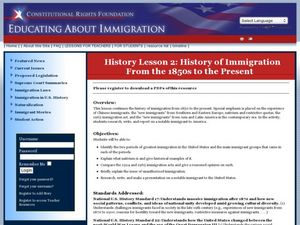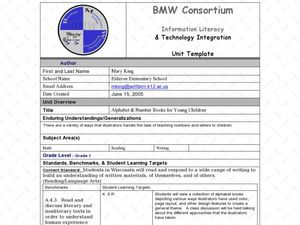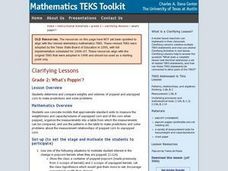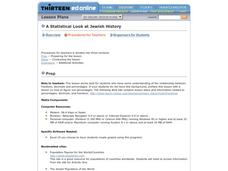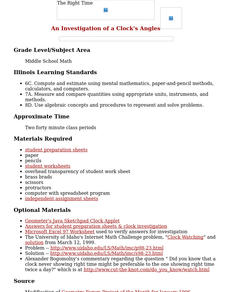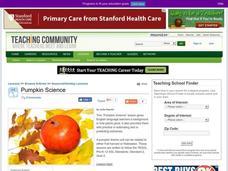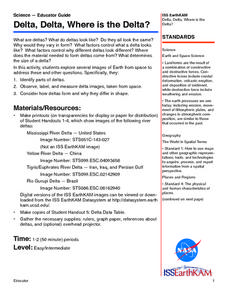Curated OER
Introducing Angles
Sixth graders identify, compare and interpret the characteristics of polygons and angles in order to meet spatial sense, geometry and measurement standards. They also sort shapes into three categories, polygons (regular and irregular)...
Curated OER
History of Immigration From the 1850's to the Present
Eleventh graders study the history of immigration from 1850 to the present. In this American History lesson, 11th graders compare the 1924 and 1965 immigration acts and give a reasoned opinion on each. Students research,...
Curated OER
Alphabet & Number Books for Young Children
First graders create either an alphabet or number book using Kid Pix software. For this alphabet and/or number unit, 1st graders design a themed alphabet and/or number book using the Kid Pix software over the course of three weeks....
Curated OER
Solar System Bead Distance Activity
Students create a scaled solar system model using colorful beads. For this space science lesson, students convert AU units into metric measurements. They arrange the planets according to their distances from the sun.
Curated OER
Mighty Earth Movers
Note that although the publisher lists almost all of the Common Core standards for both math and language arts, you will most likely want to take the general topic and choose which area to focus on. Regarding math, pupils measure worms...
Curated OER
What's Poppin'?
Second graders determine and compare weights and volumes of popped and unpopped corn to make predictions and solve problems. Students combine the data of each group into a graph. They construct questions, statements and story problems...
Curated OER
Rates in Linear Mechanical Systems
Students examine factors that control rates in mechanical system. They identify units associated with speed, calculate speed of moving object, identify units associated with acceleration, and calculate acceleration of moving object.
Curated OER
Mini-Metric Olympics
Eighth graders participate in the mini-metric Olympics. In this measurement lesson, 8th graders solve real-world problems that require them to calculate length, area, and volume in metric units.
Curated OER
The Wheels on the Bot Go Round and Round, Part I
Students determine how speed is measured. In this physics lesson, students design an experiment to find out if the robot's drive wheel size affects its speed. They collect data and discuss results.
Curated OER
A River Ran Through It
Students research how water is used to generate electricity. They investigate water's potential-to-kinetic energy transfer in hands-on activities about falling water and waterwheels. They take measurements, calculate averages and graph...
Curated OER
Waterwheel Work
Students investigate the history of the waterwheel and common uses for water turbines today. They construct an experimental waterwheel using a two-liter plastic bottle, measure the rate of revolution of a waterwheel, and complete a...
Curated OER
A Statistical Look at Jewish History
Learners complete their examination over the Jewish Diaspora. Using population figures, they discover the importance of percentages in exploring trends. They use their own ethnic group and determine how it is represented in the United...
Curated OER
How Big Is It?
Fifth graders look at the Garrison flag and estimate how big it is. For this measurement lesson plan, 5th graders then calculate the area and perimeter of the flag.
Curated OER
Our Water Resources
Students build a model aquifer to study groundwater zones and water table formation. Students use the models to measure the movement of polluted groundwater.
Curated OER
U.S. History: What Happened Here?
Learners apply the global positioning system to create maps of local historical sites. By collaborating with local historical groups, they research events and relate them to broader, national history. In addition to writing essays...
Curated OER
Space Science:Wherever You Go, There You Are
Students explore navigation principles by observing, measuring, and interpreting data to determine locations. Using a compass, compass rose, and a transit, they plot courses and discover the workings of the Global Positioning System...
Curated OER
Geometry Jeopardy
Students identify the pattern in a problem. In this geometry lesson, students make predictions, collect and analyze data. They apply the idea of scales and measurements to the real world.
Curated OER
The Right Time
Students compute and estimate using mental mathematics, paper-and-pencil methods, calculators, and computers. They measure and compare quantities using appropriate units, instruments and methods. They utilize worksheets imbedded in this...
Curated OER
Science Inquiry Lesson: Mapping Project
Learners explore the methods of creating maps. They create a map of Animas River Park using a compass and measuring tape, develop a single map from the team map sections, and devise another map of the Animas River Park using a GPS unit.
Curated OER
Surveying: 19 Chains and 50 Links
Through an interdisciplinary lesson, emerging engineers explore the history of surveying systems. After discussing various systems, they perform surveys on printable pages. Using their geometric skills, they physically stake out plots...
Curated OER
Earth Science: In Depth Look at Earthquakes
Learners engage in an interactive Internet instructional activity covering the reasons and results of earthquakes. After reading eyewitness accounts and viewing animations, they use seismograms to measure and locate the epicenters. In an...
Curated OER
Is A Nation Always A Region?
Students define the term, "nation," and analyze the boundaries established in Africa by colonial powers. In small groups, they participate in a simulated United Nations, develop a list of questions, analyze the nations of Africa, and...
Curated OER
Pumpkin Science
Students investigate how plants grow by analyzing pumpkins. In this agricultural activity, students read The Biggest Pumpkin Ever by Steven Kroll, and draw pictures of a pumpkin in each of its growing stages. Students measure and dissect...
Curated OER
Delta, Delta, Where is the Delta?
Pupils explore several images of Earth from space. They identify parts of deltas. They observe, label, and measure delta images, taken from space. They consider how deltas form and why they differ in shape.



